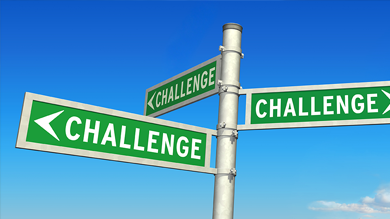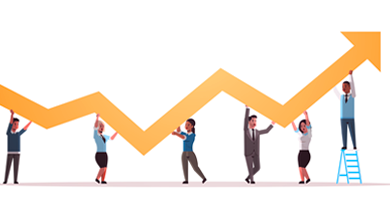DAMIEN
CLéRIS
Global Co-Head of Coverage
The Covid-19 crisis is a challenging period for everyone – is that the case for bankers in particular?
Our role as senior bankers really takes on a fresh dimension during these times of severe turbulence when companies must deliberate, analyze and make choices. Our role is first and foremost to listen to our clients, as we draw on our extensive knowledge of their businesses and our longstanding trusted relationships with them. We provide them with ideas, we challenge them and sometimes disagree with them: and ultimately the decisions lie with them. Since the start of March 2020, we have worked very closely alongside our clients. We were obviously unable to meet them physically at the start, but our teams worked flat out to ensure that we maintained our constant dialogue on existing solutions, and provided information on the market situation, as we organized meetings with our economists and experts, etc. We were also very active in bank and non-bank financing in the second quarter, to support them in their cash management and – particularly in France – to offer guidance in state-guaranteed loans. Once we had dealt with the initial emergency, we then sat down and helped our clients analyze their situation with the clear goal of supporting them in their strategic transactions with input from all Natixis’ business lines.
Did state-guaranteed loans effectively act to protect companies in France, and are they sufficient?
France was one of the quickest countries to roll out state-guaranteed loans, despite it being a complex process to implement. French banks very effectively played their role, particularly Natixis’ parent company, Groupe BPCE. State-guaranteed loans have now covered the initial requirements – ensuring treasury needs are met – so we will now start to see situations where companies cannot manage their debt over the long term. Some companies will handle the situation themselves by calling on investors on the capital markets to adapt, transform and strengthen their businesses. Meanwhile the public authorities are working on a number of support packages for the others. France and Europe have been rolling out hefty stimulus programs and will support companies that operate in selected sectors i.e. infrastructure, energy transition, technology, healthcare, etc. Additionally, a second instalment in the rescue program will be implemented by the first quarter of 2021 – although the details have not yet been set out – for companies that have been hit by the crisis, with the aim of helping them bolster their capital and recover a degree of solvency to give them some scope to pursue their growth. So in my view, these state-guaranteed loans have achieved their goal of avoiding payment defaults and corporate bankruptcies in the short term and thereby shoring up the economy.
Is this state aid sustainable in the long term?
Once again, the various situations are very different. The sooner companies acted to manage their cashflow, optimize costs and cut back expenses using the support on offer, the quicker they got themselves in a position to deal with a long-lasting crisis. A lot of our clients took preventive action to prepare for the worst-case scenario, but the actual situation was less severe. However, it is not advisable to have very high corporate debt, but we avoided the worst.
How did French companies make it through the crisis?
The French market has a very diverse range of companies. The leading group of companies – the largest companies and those that operate in sectors such as tech and healthcare – have come out well as a result of their robust pre-crisis business, with some even reinforcing their business model during lockdown. After the first part of the crisis – which we have not entirely emerged from – these companies are still supported by their banks and all the financial markets. This is a fairly buoyant market for them, and they are in a strong position to pursue their strategic transactions.
What about the second group?
The second group includes companies that were healthy before the crisis, but have suffered a dent to business as a result of the Covid-19 epidemic. The crisis is now taking a more long-term dimension, so while they have safeguarded their cash, their debt will curb their ability to invest and grow in the long run. They will need to strengthen their financial structures, potentially by issuing new shares or selling non-core assets, before they can start moving forward – a bit like a boat that needs to lighten its load to stay afloat.
And the third category?
The third group comprises companies that have suffered severely and that are still far from pre-crisis business levels. They are managing to stay afloat with state-guaranteed loans, but they are in a much weaker position, and will have a lot of trouble making it through the crisis without support.
What is your advice for these companies in the current situation?
We have very productive discussions with all our clients, both large and medium-sized firms, but we obviously take a very different stance depending on their individual situations. With the first group, we have been stepping up our strategic dialogue to support their transformative transactions, while we also work with the second group to support them in restoring a healthy financial situation and bolstering their capital. More extensive strategic dialogue is required with the third group to determine how to transform these companies and how to save them. This can involve a change in shareholder structure or major restructuring plans: these decisions will have a much greater impact for the third group, even for existing shareholders. It is not always easy to make these choices, so we provide an outside view that is less emotionally involved than a manager’s or shareholder’s standpoint.
Do you feel optimistic about 2021?
Things will not get back to normal straight away, and current volatility and uncertainty do not help in making long-term investments, as these require companies to look to the future. Some sectors, such as airlines, hotels and events are set to struggle for a long time to come. However, the situation is not as bad as we may have feared a few months ago, and for some companies, business has resumed almost 100% as consumers have adapted their behavior. I am reasonably optimistic for our clients: I can see that many of them have taken decisive action to adapt to this challenging time, and solutions are available for most of them. There has also been a surge in strategic transactions since September, such as M&A, equity deals and fund-raising, which indicates that a number of economic stakeholders are pressing ahead again. This period is also an opportunity for us to further support our clients and truly play our role at their side!

















